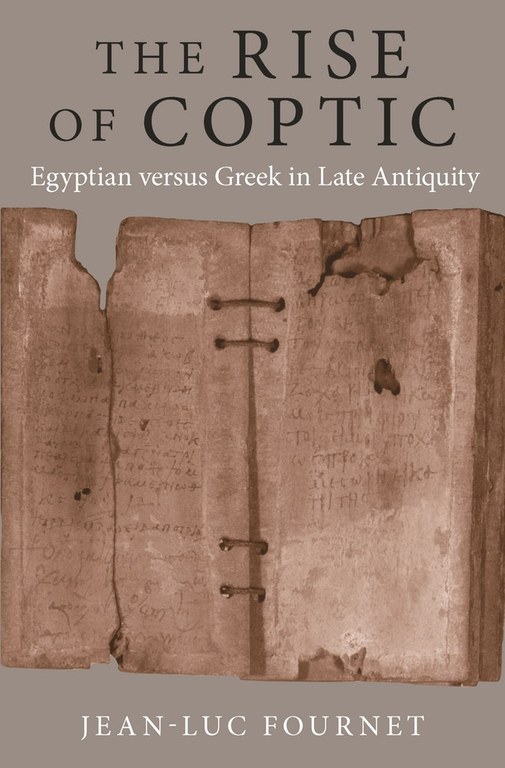New publication of the latest installment of the Rostovtzeff lectures by Prof. Jean-Luc Fournet
The Institute for the Study of the Ancient World and the Princeton University Press are very pleased to announce the publication of the latest installment of the Rostovtzeff lectures, The Rise of Coptic: Egyptian versus Greek in Late Antiquityby Prof. Jean-Luc Fournet. Fournet holds the Chair of Written Culture in Late Antiquity and Byzantine Papyrology at the Collège de France in Paris and delivered the eighth annual Rostovtzeff lectures at ISAW in 2017.
 After half a millennium of Greek linguistic and cultural dominance under the Macedonian and Roman imperial regimes, Coptic emerged as the written form of the Egyptian language in the third century CE by adapting and expanding the Greek alphabet. Yet, after its relatively rapid rise, it succeeded in achieving only quasi-official status as an administrative language by the time of the Arab conquest of Egypt in 641: Coptic was largely restricted to biblical translations, private correspondence, and internal monastic communications, while Greek retained its monopoly on administrative, legal, and literary writing.
After half a millennium of Greek linguistic and cultural dominance under the Macedonian and Roman imperial regimes, Coptic emerged as the written form of the Egyptian language in the third century CE by adapting and expanding the Greek alphabet. Yet, after its relatively rapid rise, it succeeded in achieving only quasi-official status as an administrative language by the time of the Arab conquest of Egypt in 641: Coptic was largely restricted to biblical translations, private correspondence, and internal monastic communications, while Greek retained its monopoly on administrative, legal, and literary writing.
Prof. Fournet traces the rich and complex history of this fascinating linguistic revolution, showing how the rise of Coptic took place amid profound cultural, religious, and political changes in late antiquity; and further how all this changed during the crucial sixth century, when Coptic began to penetrate domains that were once closed to it, such as literature, public administration, private business, and official communications between the state and its subjects. Fournet’s probing history of the last phase of the Egyptian language, and how its history differs from the experience of other vernacular languages in the late antique Roman Near East, will be of interest to those who study questions of language, identity, politics and religion, in particular early Christianity, in Mediterranean antiquity or indeed any other multicultural, multilingual society.
Each spring ISAW sponsors a series of four lectures, named after the great ancient historian Michael I. Rostovtzeff. A Russian ancient historian, Rostovtzeff came to the U.S. after the Russian Revolution and taught for many years at Yale University as Sterling Professor of Ancient History. Rostovtzeff’s prodigious energies and sprawling interests led him to write on an almost unimaginable range of subjects. ISAW’s Rostovtzeff series presents scholarship that embodies its aspirations to foster work that crosses disciplinary, geographical, and chronological lines. The next Rostovtzeff lectures will be delivered by Pavel Lurje, Senior Research Fellow and Head of the Section of Central Asia, Caucasus and Crimea in the Oriental Department of the State Hermitage Museum in Saint Petersburg, Russia. Please see the Rostovtzeff lectures page on the ISAW website for further information about the lectures or to reserve a seat.